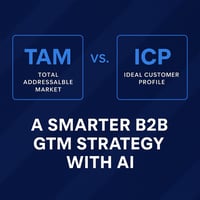You’ve built campaigns, hired SDRs, invested in ABM tech, and still, your pipeline is short. The...
How to Get Found in AI Search: Semantic SEO for B2B Teams
Search has changed. Today's buyers use AI tools like Google's Search Generative Experience (SGE), ChatGPT, and Perplexity to ask full questions, research in natural language, and expect smarter results.
When is the last time you looked at the search results in Google first?

If your content is still written for keyword match instead of semantic intent, you're invisible in the AI-powered buyer journey.
In this post, we explain what semantic SEO is, how it works, and how B2B teams can use it to stay relevant and visible in AI search.
What Is Semantic SEO?
Semantic SEO is the process of optimizing content for meaning, context, and intent, not just individual keywords. It is how search engines and AI understand what the user really wants and serve content that answers that deeper intent.
Instead of writing for exact match phrases, semantic SEO focuses on answering real questions using natural language.
Why AI Search Changes the Rules
AI tools do not just match keywords. They understand questions. Tools like ChatGPT and Google SGE look for content that:
- Covers a topic deeply and thoroughly
- Uses natural language and semantic relationships
- Includes related terms, questions, and subtopics
This means publishing blog posts that look and feel like helpful conversations, not just lists of keywords.
How to Optimize Your Content for AI Search
To perform well in AI search, follow these best practices:
- Map out real buyer questions using interviews and keyword research tools.
- Build topic clusters with cornerstone content and supporting articles.
- Use clear, natural language.
- Include related questions, FAQs, and examples.
- Use headings, bullets, and internal links to structure your content.
Semantic SEO Is the Future of Visibility
To get found in AI-powered search experiences, your content must be helpful, readable, and contextually relevant. Semantic SEO is how you future-proof your visibility.
At Sitera, we help B2B teams build search-optimized content that connects with AI systems and human buyers.
Let’s talk: https://www.siteraconsulting.com/contact
FAQ
What is semantic SEO?
Semantic SEO is a content strategy that focuses on meaning, context, and intent rather than just keywords. It helps search engines understand and rank your content.
Why is semantic SEO important for AI search?
AI tools prioritize content that reflects real buyer questions and covers related ideas in depth. That is the foundation of semantic SEO.
How do I optimize my content for AI-generated results?
Structure your content around real questions, use clear headings, include related concepts, and make sure it is easily understandable to both people and search engines.
.png?width=750&height=300&name=SITERA%20CONSULTING%20(Logo).png)


